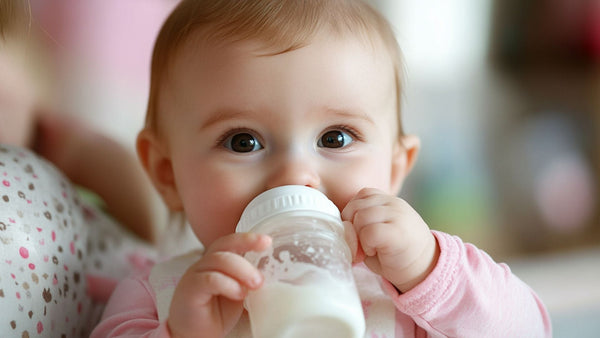Is Powder or Liquid Formula Better for My Baby?
As parents navigate the endless choices in baby care, one question consistently arises in our conversations at Organic Life Start: Is liquid formula better than powdered formula? With our team of eight experienced moms, who have raised multiple generations of children, we've seen firsthand how this decision can impact both your daily routine and your baby's comfort.
The truth is, there's no one-size-fits-all answer. Every family's situation is different, and what works perfectly for one baby might not be ideal for another. We've learned through our collective decades of parenting experience that children respond more effectively when given quality options that suit their individual needs.
Is powder formula better than liquid? Both powder and liquid formulas can provide excellent nutrition when you choose high-quality brands. The key is understanding which format aligns best with your lifestyle, budget, and most importantly, your baby's specific requirements. Before making any decisions, we recommend consulting with your pediatrician — they are familiar with your child's health history and can guide you toward the best choice.
Powder Formula — Convenient and Budget-Friendly
When we first started curating European organic formulas for Organic Life Start, we thought: ready-to-feed vs powder formula? But we noticed that powder formulas consistently won over parents for several practical reasons. Brands like HiPP, Holle, and Kendamil have mastered the art of creating nutrient-dense powder formulas that offer real-world benefits for busy families.
Through our experience helping thousands of parents, we've seen how powder formulas can be a game-changer. One of our community moms, Lisa, switched to HiPP Stage 1 powder when her twins were born, and she still talks about how it made those hectic early months more manageable.
-
The advantages we've observed:
A baby powder formula typically costs significantly less per serving than liquid alternatives. For families feeding multiple children or those on a tight budget, this difference can be substantial. We've calculated that parents can save hundreds of dollars per year by choosing quality powder options.
An unopened powder formula can last for months when stored properly, giving you peace of mind and reducing waste. The compact packaging makes the powder formula perfect for outings, vacations, or day trips. You can pack exactly what you need without worrying about refrigeration or heavy containers.
-
The challenges we've encountered:
You'll need access to clean water and proper sterilization, which can be challenging when you're on the go. Improper mixing or storage can introduce bacteria; therefore, we always emphasize the importance of following preparation instructions precisely. When your baby is screaming hungry at 3 AM, those extra few minutes of preparation can feel like an eternity.
Liquid Formula — Ready-to-Use Convenience
The best ready-to-feed formula has been a lifesaver for many families in our community, especially during those challenging newborn days when every minute counts. We've seen new parents practically tear up with relief when they discover how much easier feeding becomes with ready-to-use options.
Olivia, one of our team members, remembers using liquid formula exclusively for the first month with her premature baby. The pediatrician recommended it for its sterility, and the convenience factor helped her maintain sanity during those intensive early weeks.
-
The advantages that have impressed us:
No mixing, no measuring, no waiting. Open the container and feed — it's that simple. This is invaluable during night feedings or when you're dealing with a fussy baby who doesn't want to wait. Liquid baby formulas are commercially sterilized, eliminating the risk of contamination from water or improper mixing. For premature babies or those with compromised immune systems, this can be crucial.
-
The drawbacks we've noticed:
Liquid formula can cost two to three times more than powder alternatives. For long-term feeding, this adds up quickly. Once opened, most liquid formulas must be used within 48 hours and kept refrigerated. We've seen parents accidentally waste expensive formulas because they forgot about this requirement. The larger containers occupy a significant amount of refrigerator space, so you'll need to plan to ensure you don't run out.
Liquid vs Powder Formula: What's Best for Your Baby?
After years of helping parents navigate this decision, we've developed a framework for thinking through the choice. Here's how we break down the key considerations:
-
Convenience vs. Cost. Liquid wins for immediate convenience, but powder offers more flexibility for planning. If you're exclusively breastfeeding and only need occasional formula, liquid might be perfect. For daily use, many families find powder more practical and economical.
-
Safety Priorities. Liquid formula offers superior sterility, making it the preferred choice for premature babies, newborns in their first few weeks of life, or babies with special medical needs. For healthy, full-term babies, properly prepared powder formula is equally safe.
-
Lifestyle Factors. Consider your daily routine. Are you frequently on the go? Liquid might be worth the extra cost. Do you have reliable access to clean water and proper preparation space? Powder could work beautifully.
Through our work at Organic Life Start, we've learned that many successful parents actually use both types strategically. They rely on powder for daily feeding at home and keep liquid on hand for emergencies, travel, or particularly challenging days when convenience is most important.
What's the difference between powder formula and ready-to-feed? The main differences lie in preparation, cost, and sterility. Powder requires mixing but costs less and stores longer. Ready-to-feed options offer convenience and sterility, but they are more expensive and have a shorter shelf life once opened.
Is liquid better than powder for all babies? Not necessarily. For healthy, full-term babies, properly prepared powdered formula provides the same nutrition as liquid formula. The choice often comes down to family preferences, budget, and lifestyle factors rather than nutritional superiority.







